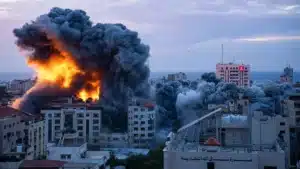Antifa and the Israel-Palestine Conflict: Does Antifa Support Hamas?
The Israel-Palestine conflict, a long-standing and deeply contentious issue, often serves as a litmus test for political and ideological groups worldwide, revealing their stances on human rights, colonialism, and resistance movements. In the United States, the Antifa movement, predominantly recognized for its anti-fascist stance, has been sporadically linked with expressions of support for Palestinian causes. This complex relationship merits a nuanced exploration, particularly in the context of Antifa’s inherently decentralized nature. This essay aims to dissect the layers of Antifa’s involvement in the Israel-Palestine conflict, focusing on instances of support for Palestine and Hamas while critically analyzing the representativeness of these instances within the broader spectrum of the movement.
Antifa’s Ideological Foundations and Decentralized Structure
Antifa, short for “anti-fascist,” is an umbrella term for a heterogeneous array of groups and individuals aligned against fascism, racism, and other forms of extreme right-wing ideology. Characterized by its decentralized structure, Antifa lacks a unified command or a cohesive policy framework, resulting in a diverse assortment of beliefs and actions under its banner. This decentralized nature is crucial in understanding the movement’s involvement in any cause, including the Israel-Palestine conflict. Without a central governing body or official spokespersons, Antifa’s stance on most issues, particularly international ones, remains fragmented and varied.
This lack of centralized organization means that actions or statements by individuals or groups within the Antifa movement cannot be straightforwardly attributed as representative of the movement as a whole. The diversity within Antifa ranges from radical anarchists to more moderate left-wing activists, each bringing their unique perspectives to the movement’s actions and rhetoric. This diversity is reflected in their involvement in various causes, where the movement’s support or opposition may vary significantly depending on the group or individuals involved.
Moreover, Antifa’s actions and stances are often reactive, responding to immediate instances of perceived fascism or authoritarianism. This reactionary nature further complicates any attempt to distill a coherent or consistent stance on protracted political issues like the Israel-Palestine conflict. As such, when examining Antifa’s involvement in this conflict, it is essential to differentiate between individual actions and a collective movement stance, understanding that the latter may not exist in a conventional sense.
Documented Instances of Support for Palestine and Hamas
Instances of support for Palestine and Hamas within the Antifa movement have been documented, though their frequency and representativeness within the movement are subject to debate. The Anti-Defamation League (ADL) has reported several instances where individuals and groups, possibly associated with Antifa, have expressed support for Hamas and the Palestinian resistance at various rallies across the United States. These instances have manifested in various forms, including chants glorifying the intifada, signs declaring that “resistance is not terrorism,” and speeches expressing solidarity with Hamas’s cause. For instance, at a rally in Anaheim, California, a speaker emphasized the importance of mobilizing in the U.S. to support Hamas. This stance aligns with the broader narrative of resistance against perceived oppression and colonization.
However, these instances, as reported by the ADL, vary significantly in tone and context, ranging from explicit support for Hamas to more general endorsements of the Palestinian cause. This variability is indicative of the diverse perspectives within the Antifa movement. While some groups or individuals may explicitly support Hamas, others may be more aligned with the broader cause of Palestinian rights without endorsing Hamas’s tactics or ideology. This distinction is critical in understanding the nuances of Antifa’s involvement in the conflict.
Furthermore, the context in which these expressions of support occur is also important. Many of these instances have taken place within larger protests or rallies focused on broader issues of human rights and anti-colonialism, where support for Palestinian causes may be one aspect of a wider agenda. This context suggests that, for some within the Antifa movement, the support for Palestine and Hamas may be part of a larger critique of global power structures and a call for resistance against perceived injustices rather than an outright endorsement of Hamas as an organization.
While it’s difficult to say if Antifa supports Hamas, many groups that have traditionally aligned with Antifa have shown support for Palestine over Israel’s defense against the recent horrific terrorist attacks committed by Hamas.
The Complexity of Attribution and Public Perception
Attributing a collective stance on Palestine and Hamas to the Antifa movement is fraught with challenges, given its decentralized nature. The actions of individual members or groups within Antifa do not necessarily reflect a unified movement stance. This ambiguity is often a source of contention in public discourse, especially among conservative commentators and media outlets. In these circles, Antifa’s involvement in pro-Palestine rallies and expressions of support for Hamas are frequently cited as evidence of the movement’s extremist and anti-Semitic tendencies. However, such characterizations overlook the complexities of a decentralized movement where a spectrum of ideologies and stances coexist.
The public perception of Antifa’s stance on the Israel-Palestine conflict is further complicated by the movement’s generally antagonistic relationship with mainstream media and conservative political groups. This antagonism often leads to a polarized portrayal of Antifa’s actions and beliefs, with little room for nuance or understanding of the movement’s internal diversity. As a result, instances of support for Palestine and Hamas within the Antifa movement are often amplified and generalized as representative of the entire movement, overlooking the fact that these instances may be isolated expressions within a broad and varied spectrum.
Moreover, the controversy surrounding Antifa’s perceived stance on the Israel-Palestine conflict underscores the broader challenges of attributing a coherent political position to a decentralized and diverse movement. Without official statements or a central governing body, the interpretation of Antifa’s stance remains subject to individual perspectives and the selective framing of their actions in the media. This situation highlights the need for a more nuanced and critical analysis of Antifa’s involvement in political issues, which acknowledges the movement’s inherent diversity and complexity.
It’s Complicated
In conclusion, while there is evidence of support for Palestine and Hamas within certain segments of the Antifa movement, these instances should be viewed within the context of Antifa’s decentralized and diverse nature. The attribution of a collective stance on the Israel-Palestine conflict to the entire Antifa movement is problematic, given the wide range of ideologies and perspectives that exist within its ranks. The documented instances of support, as reported by organizations like the ADL, highlight the need for a nuanced understanding of Antifa’s involvement in political issues, one that recognizes the complexity and variability of stances within a decentralized movement.
As the Israel-Palestine conflict continues to evoke strong opinions and actions across the political spectrum, it is crucial to analyze any group’s involvement with a critical and discerning eye, acknowledging the multifaceted nature of political activism and the diversity of voices within any movement. In the case of Antifa, this means recognizing the limitations of attributing a unified stance on complex international issues and understanding that the actions of individuals or groups within the movement may not necessarily represent the movement as a whole.







